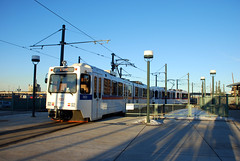 Denver is expanding its light rail system using private partners. |
Maryland Governor O’Malley is expected to announce today that the federal government has approved the Purple Line’s planning, and that Maryland will seek a private company to help pay for construction.
The idea is that a private company would pool its money together with state and federal funding to construct the Purple Line. The same company would then operate the line. In exchange, they would keep the fares, and Maryland would pay an annual contract fee.
With limited federal funds available, this type of public-private partnership is becoming common nationwide. DC is considering it for streetcars, but Denver offers a more instructive example.
In 2004, voters in Colorado passed a referendum for 122 miles of new rail transit in the Denver area. But the funding approved as part of that vote wasn’t adequate to build everything, so the transit agency had to find an alternate strategy. They’ve since approved two public-private partnerships, and are in the process of contracting a third.
Denver’s first partnership was for the Eagle P3 project, which is building 40 miles of electric commuter rail to the Denver suburbs and airport, at a cost of about $2 billion. The partnership is proceeding smoothly, with construction well underway and completion expected in 2016.
The second partnership is for a 10-mile-long suburban light rail extension. It began construction last year and is also expected to open in 2016.
The third will be for the 18-mile North commuter line. The transit agency put out a Request For Proposals in June, and is expected to select a partner company this fall.
All in all, Denver has or will soon have private partnerships to build almost 70 miles of new rail.
These deals do come with a cost. Typically the annual fee the state has to pay the partner is higher than the typical operating subsidy would be. So in essence, the operating cost is higher. But in exchange, the partner builds the line more quickly and sometimes more cheaply than the government could on its own.
Update: As expected, O’Malley announced the plan to use a partnership this afternoon. He also announced $680 million in state funds for the Purple Line, plus millions more for the Corridor Cities Transitway, Montgomery County Ride-On, and road projects.
August 5th, 2013 | Permalink
Tags: commuterrail, funding, government, lightrail, transportation













